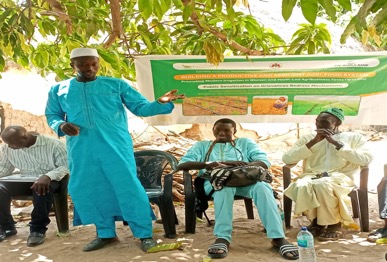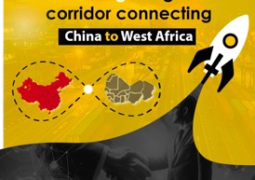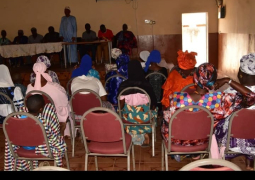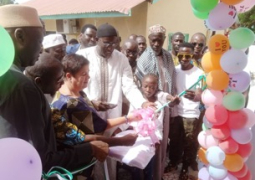
The community outreach held at Sinchu Alagie, Mbayen, Hamdalai and N’gawar in the Niamina East District, targets village heads, VDC members, district chiefs, women and youth-led agri-business firms being supported by the project.
The exercise also seeks to expose participants to the GRM and all the related Environmental and Social Safeguard Instruments (ESSI) developed by the project so as to guide the implementation of activities supported by the project.
Addressing the gathering, Omar Touray, Chief of Niamina East District while commending government and WB for the WYLAFs initiatives, expressed optimism that once operational, the intervention will significantly contribute towards the transformation of agric-food systems for better life, good nutrition and increased income and social wellbeing.
He challenged the target beneficiaries of the WYLAFs and other investments from the project to make maximum use of the assistance, while assuring his support to smooth implementation of the project activities.
John Mendy, agriculture director for Central River Region south, acknowledged that the project through its seeds and fertiliser programmes, matching grant for SMEs as well as its support to strengthen the extension service of the Department of Agriculture, is already impacting positively on lives and livelihoods.
The WYLAFs initiatives, he added, would further help build the resilience of farmers for improved food security, nutrition and socio-economic status of women and youths.
Speaking at the various meetings, Fafanding Katiri Kinteh, Social Development Specialist of the GIRAV Project and the Central Projects Coordinating Unit (CPCU) of the Ministry of Agriculture, said the execution of the WYLAFs would include establishment of a chained–link perimeter fence for the 5-hectare garden to be equipped with a solar-powered irrigation system and a multi-purpose facility.
“The implementation of all these sub-projects would create employment for hundreds or thousands of people who will be based in the intervention sites and thus creating an environment that put women and children of the host communities at risk of Gender-Based Violence GBV) (including Sexual Abuse and Exploitation (SAE), Sexual Harassment (SH) and Violence Against Children (VAC) which remain a global problem.”
To address that global problem, he said, the WB in their investment projects put in measures to mitigate the problems of the GBV. Key among those measures is the preparation and validation of the safeguard instruments to be used during project implementation.
The project, he added, is committed to engaging and sensitising its stakeholders including the beneficiary communities more especially the women and young girls, who remain the most vulnerable group to GBV during project implementations.
“The project will provide a Toll-Free number for the general public to facilitate timely reporting of grievances to the relevant authorities for redress.” he added.
Read Other Articles In National News
OSPG engages NAMs on renewed accountability roadmap
Sep 26, 2022, 11:29 AM




